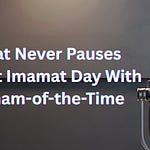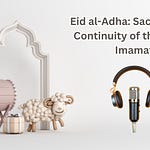Ya Ali Madad and welcome to today’s episode. Together, let’s turn to the guidance of the Imam of our time and the wisdom of our Pirs as we explore today’s deeply spiritual and thought-provoking topic.
Today, we’ll examine the matter of alcohol consumption through the lens of the Quran and the guidance of our beloved Imam, Mawlana Shah Karim Al-Hussaini Hazar Imam (Allaihi Sallam). Along the way, we’ll reflect on historical examples, the transformative journeys of Ismaili Dais, and the timeless wisdom of our Imams.
Gradual Prohibition of Alcohol in the Quran
The Quran approaches the subject of alcohol with gradual guidance, leading believers step by step toward complete prohibition.
Initial Guidance:
In Surah Al-Baqarah (2:219), Allah says:
"They ask you about wine and gambling. Say, 'In them is great sin and [yet, some] benefit for people. But their sin is greater than their benefit.'"
This verse acknowledges the existence of some benefit in alcohol but emphasizes that its harms outweigh those benefits. This was the first step, preparing believers for stricter prohibitions to come.
Restrictions on Prayer:
Later, in Surah An-Nisa (4:43), believers are instructed:
"Do not approach prayer while you are intoxicated until you know what you are saying."
This was a significant restriction, as it directly impacted one’s ability to engage in worship. It highlighted the incompatibility of intoxication with spiritual awareness.
Complete Prohibition:
Finally, in Surah Al-Ma’idah (5:90-91), alcohol is explicitly forbidden:
"O you who have believed, indeed intoxicants, gambling, [sacrificing on] stone alters, [and] divining arrows are but defilement from the work of Satan, so avoid it that you may be successful."
These verses warn us of the enmity and distraction caused by such substances, emphasizing that they hinder remembrance of Allah.
Examining the Modern Context
Now, you might wonder:
“If alcohol is harmful, but I drink socially, follow the laws of my country, and harm no one, how can it still be sinful?”
This is a valid question, and it brings us to the guidance of the Imam of our time.
Hazar Imam Mawlana Shah Karim Al-Hussaini (Allaihi Sallam), in an interview with The Sunday Times on December 12, 1965, said:
"The thing which separates man from the animals is his power of thought. Anything that impedes this process is wrong. Therefore, alcohol is forbidden."
From this guidance, we understand that our ability to think and reason is a divine gift. Anything that clouds our judgment or impairs our thinking separates us from our higher purpose.
A Transformative Journey: The Example of Nasir Khusraw
Let’s turn to the life of Ismaili Dai, scholar, and Hakim Nasir Khusraw.
Nasir Khusraw once consumed wine to escape worldly sorrows. However, after a profound dream, he realized the folly of seeking solace in intoxication. In this dream, he was told:
"Putting one’s mind to sleep to escape worldly sorrow is not wisdom. True wisdom lies in seeking answers and allowing the soul to soar."
This realization transformed his life. He gave up alcohol and embarked on a spiritual journey that eventually led him to the Imam of the time, Imam Mustansirbillah (Allaihi Sallam), and his great teacher, Dai Al-Mu'ayyad fi'l-Din Shirazi (Rahemtulla Allaihi).
Just as a mobile phone requires a proper connection to function, our minds must remain clear to remain spiritually connected.
Wisdom from Our Imams
Our Imams have given clear guidance on this matter. Let’s reflect on two powerful farmans.
Hazar Imam Mawlana Sultan Muhammad Shah (Allaihi Sallam), addressing Muslims in Transvaal in 1954, said:
"The greatest danger to every Muslim citizen ... is alcohol. Time has shown that it is an injury to you, an injury to your person, an injury to your health. It is forbidden because it carries greater evil than good. Avoid it at all costs."
Hazar Imam Mawlana Shah Karim Al-Hussaini (Allaihi Sallam), in an interview with Syrian TV on August 29, 2008, emphasized:
"Progress does not mean occidentalisation. Progress in the Ummah means moving forward in quality of life, but not giving up your identity, not giving up your value systems."
These farmans remind us that alcohol not only harms the individual but also weakens the collective strength of the community.
A Call for Reflection
After reflecting on the Quran, the farmans of the Imam, and the examples from Ismaili history, it becomes clear: any form of intoxication is harmful and prohibited.
However, the Imam, in his infinite wisdom, leaves it to us to decide:
Do we seek momentary relief, or do we strive for the everlasting peace of the soul and intellect through the love of the Imam and recognition of his guidance?
As the Quran reminds us in Surah Ar-Ra’d (13:11):
"Indeed, Allah will not change the condition of a people until they change what is in themselves."
Thank you for joining us on this journey of reflection and learning. May we all strive to live with clarity of thought, guided by the light of our Imam and the timeless wisdom of the Quran.
Ya Ali Madad.












